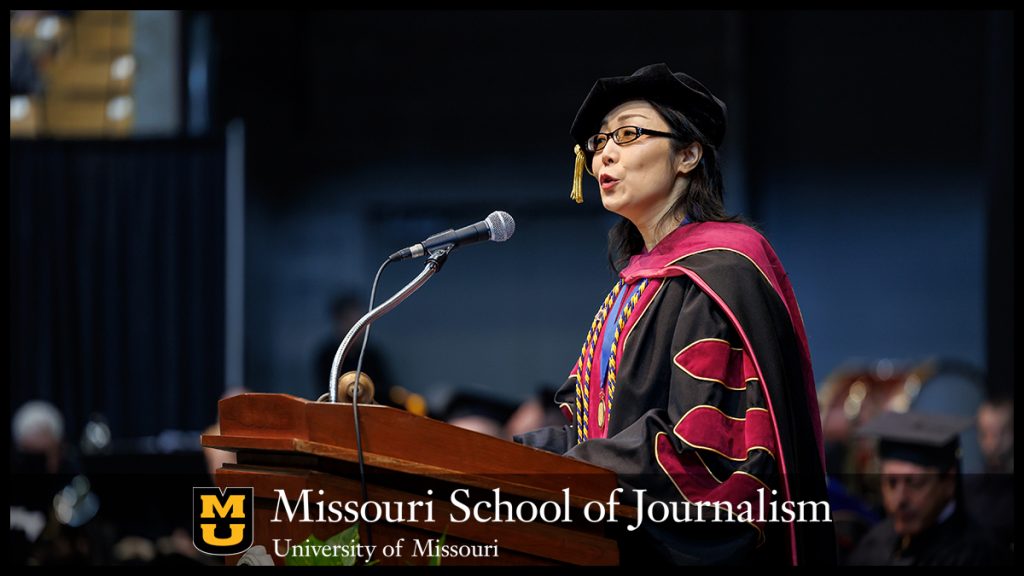Yong Volz makes her mark on history at Missouri School of Journalism

COLUMBIA, Mo. (Aug. 24, 2023) — Yong Volz, the Roger Gafke Distinguished Faculty Fellow and chair of the Journalism Studies faculty at the Missouri School of Journalism, grew up learning about the School of Journalism in middle school. This might not come as a surprise unless one knows that Volz was born in Beijing and raised in Shanghai, China.
As an award-winning researcher and teacher, a top scholar in the field of journalism history and an acclaimed documenter of the tribulations and accomplishments of women in the journalism industry, she is a crucial part of the School’s teaching, research and administration efforts. But what drew her to Columbia, Missouri? While finishing her doctorate at the University of Minnesota in 2005, she had already landed several job offers, including a post-doc position at Harvard.
“When I came for the job interview, I landed at the St. Louis airport, got on MoX and rode through fields for two hours. I asked myself, where am I?” Volz said. “Of course, it felt like I was in the middle of nowhere. But when I stepped foot on campus, I saw the two stone lions.”
The lions sit beneath an archway leading to the School’s historic complex of buildings. Carved more than 600 years ago to stand guard over a Confucius temple in Nanjing, China, the statues were gifted to the school in 1931 as one of several symbols of friendship with the international community that grace the area.
“When I saw the lions, everything came alive for me,” Volz said. “A whole chapter of my dissertation had focused on the School’s historical influence on China’s development of journalism, so I had seen pictures of the lions during my archival research. But when I saw them in person, I immediately felt a sense of connection. A connection with my research and with my cultural roots.”
Leading by example
As someone who studies and teaches about the history of journalism — particularly where it involves Asian Americans and women whose contributions have sometimes gone overlooked — it is fitting that Volz herself has contributed significantly to the School’s history.
“Most of our students had never had an Asian professor before, and some were certainly skeptical.” Volz said of her arrival at the School 17 years ago. “But we did have many international students and Asian American students who told me that I made them feel like they belonged here. That there was a future for them. I always believe in leading by example. I felt like I needed to be here for them and to support them every way I can so they can push the boundaries and achieve even more.”
A pile of hundreds of thank-you cards in her office from students of all backgrounds seems to prove her right and speaks to an overwhelmingly positive impact in the classroom.
“Yong is demanding of herself and her students, but at the same time she is incredibly supportive,” said David Kurpius, dean of the School of Journalism. “For students heading into an industry that requires strict adherence to deadlines but also asks for compassionate community reporting, that is a winning combination.”
That support extends to sitting on thesis and dissertation committees, through which she has helped more than 150 students complete their research projects. Recently, she chaired the master’s thesis committee for Katelynn McIlwain, who became KBIA-FM’s first-ever audio managing editor (KBIA is the School of Journalism’s NPR-member radio station) following her graduation in May.
“I was so nervous, because this was my first time doing anything research-related,” McIlwain said. “But she was so kind. She showed genuine interest in my idea, and I felt so validated.”
Volz’s kindness and generosity with her time are oft-cited elements of her character, but McIlwain found the mentorship had a level of authenticity that went beyond mere thoughtfulness.
“She has chaired so many thesis committees and helped so many students, but every time we met, it felt like I was the only person she was working with,” McIlwain recalled. “She was really in tune with my interests and my goals.”
And even after McIlwain successfully defended her thesis, Volz’s support continued. One moment stands out in particular.
“When I was interviewing for the job I have now, she walked by, saw me and waved really excitedly in the window to cheer me on. I felt so supported in that moment. It’s those little things that demonstrate she is invested in all of me, not just ‘academic’ me.”
From scholar to mentor
Then there is her impact outside the classroom, which has manifested itself through ambitious projects like Herstory, an oral history of women in journalism collected through interviews with 34 members of the Journalism and Women Symposium. Currently, she is conducting grant-funded research into the untold stories of Asian American journalists in the 1980s who formed the Asian American Journalists Association in the post-Civil Rights Movement period.
She has earned a long list of awards for her teaching, mentorship, advising, scholarship and service, honors that don’t surprise Earnest Perry, the associate dean for graduate studies and research. Perry remembers when she came to the School, a time when Perry himself was chair of the Journalism Studies faculty.
“She was, by far, one of the top candidates in the field,” he said. “The fact that we had the opportunity to hire her was huge.”
Volz’s research has, in turn, informed her style of leadership, emphasizing the importance of solidarity, sponsorship and empowerment in mentoring relationships. As chair of the Journalism Studies group, and in her many leadership roles in national and international academic organizations, Volz has mentored numerous junior scholars and graduate students.
“This is what sums her up for me: the doctoral students she mentors are fiercely loyal to her and always give her the credit for their success,” Perry said.
As her former students will gladly tell: the loyalty is mutual.
Updated: August 24, 2023